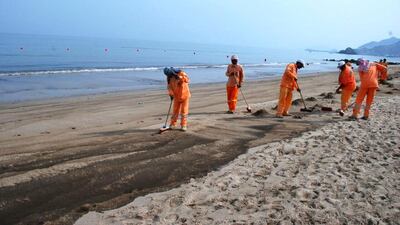FUJAIRAH // An oil tanker that was illegally washing its fuel storage area and dumping the outflow was the reason for the oil spill that affected two kilometres of coastline on Monday, causing untold environmental damage, experts said.
Tanker crews are known to surreptitiously clear out their fuel areas at night in international waters to avoid charges in port, a shipping industry source said, while an environmentalist said the spill came at the worst possible time.
“The pollution, unfortunately, occurred in the breeding season of many kinds of fish and such hydrocarbon substances can harm the eggs,” said Dr Saif Al Ghais, a marine scientist and executive director of Ras Al Khaimah Environment Protection and Development Authority.
“The effect may vary depending on the oil classification; light crude oil causes less damage than heavy crude oil, which creates tar, but both can affect surface marine species and birds.
“If the oil reaches the beach, it may also cause harm to the microscopic creatures and other species that live on the sand near the water, like small worms and seashells.”
Dr Al Ghais also said that oil could prevent birds from flying if got on their feathers and that it also affected the food they eat.
“Dumping such substances into the water is illegal and should be monitored and investigated,” he said. “If they manage to take a sample from the oil they could analyse it and trace it back to the country of origin and find out which tanker did it.
“The oil must have been in the water and the current dragged it to the shore.
“Luckily, the water keeps moving and renewing and, therefore, the effect won’t last long and won’t affect humans. Once it’s cleaned, the harm is gone.”
A shipping industry source said that some tankers head out to sea to wash their fuel tanks in an attempt to evade detection.
“Monitoring the tankers within 12 nautical miles is the responsibility of the coastguards and the port, but due to the lack of a satellite system to monitor at night, they can’t control it all the time,” he said.
“Some vessels choose to wash their tanks illegally to not pay the washing fees at the port; they might do it in international waters and the current drags it to the beach.”
Ships wash their fuel compartments if they intend to change the type of oil they are transporting.
“Penalties are available and rules are clear and strict, but adding a law that obligates ships to provide a certificate from other ports if they arrive without having any oily liquid sediment in their fuel area, implying that it has been cleaned should be fundamental.”
“The formation of an oily layer on the surface can obscure oxygen and cause the death of many marine organisms,” said a Ministry of Climate Change and Environment spokeswoman.
“The ministry, along with special authorities, are working side by side in monitoring any pollution caused by oil spills in UAE waters.”
The manager of Dibba Municipality confirmed the cause of the oil spill and said that Al Aqah beach was cleaned up in less than 24 hours.
“Oil tankers illegally washing their storage tanks and dumping the waste in international waters was the reason for the oil spill,” said Hassan Al Yamahi. “Our team managed to clear the area and discharge the waste safely.”
rhaza@thenational.ae

